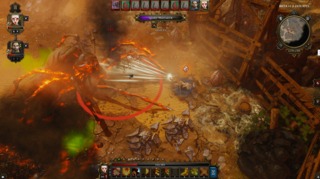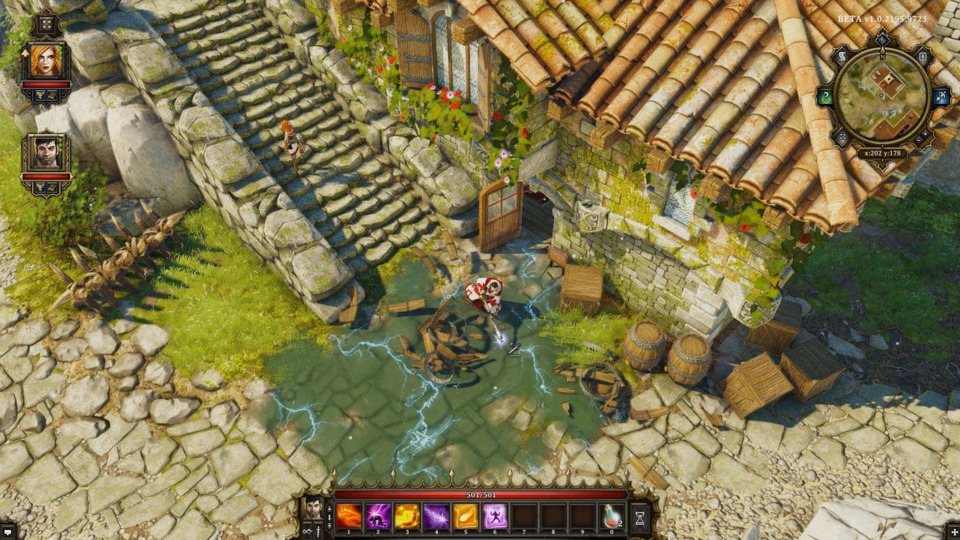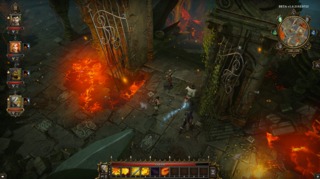Where'd the summer go? Mine disappeared into the lengthy turn-based vortex that is Divinity: Original Sin. After roughly 70 hours of casting fireballs and swinging axes with my friends Roland and Susannah, I've saved the world (for now). It's intimidating to play games you aren't familiar with. I know JRPGs, not CRPGs. The rules are scary and weird, but you have to start somewhere. Original Sin marks the third installment in the mainline Divinity franchise, and serves as a welcoming gateway into a genre only recently making a comeback.
(For reference, CRPG refers to computer role-playing games in the lineage of Baldur's Gate, Icewind Dale, and others.)

Divinity's world is one of god, men, orcs, magic--typical fantasy stuff. Players are asked to build two characters from scratch--male, female, doesn't matter--who become the leads, Source hunters looking to solve a murder. Source is a dangerously powerful form of magic long since banned for its corrupting nature. That's why you're Source hunters. Anyone found messing with Source is to be eliminated with extreme prejudice. Of course, it wouldn't be a video game if the world didn't come to an end at some point, so it doesn't take very long for Divinity to rope its characters into a near-certain apocalypse.
In the first hour, Divinity lays out its gameplay beats. Players click a customized party of warriors, thieves, and mages across a beautiful but violent world, seamlessly shifting between exploration, conversation, and combat. Though Divinity does a serviceable job of explaining its high-level concepts, it does not hold your hand and make sure you're ready to play. Divinity throws you into the deep end. Some players will love that; it's not common these days. Those lovers are, most likely, already fans of the genre. It's not uncommon to hear reports of players investing hours into Divinity, realizing they've built their characters wrong, and starting from scratch. It's easy to goof stat upgrades, and you only level every few hours. Those stories almost scared me off from even trying the game, so I kept a guide from Kotaku's Kirk Hamilton open on my iPad for the first dozen hours. It quickly became my personal bible, a cherished friend. It might not have been the purest experience, but it helped me get my feet wet, and I eventually moved forward with confidence, and crafted my own experience.
Though Divinity has a story, this game's all about combat. I've played turn-based games before, but few offer the seemingly limitless strategic freedom found in any single combat encounter. It doesn't take long to grasp the familiar mechanics. Characters have a set number of action points that regenerate each turn, and any movement, spell, or attack requires spending those points. Players and enemies swap turns, and it's always clear who's next, since it's listed at the top of the screen. What makes Divinity unique is a discrete focus on base elements. In Divinity's world, that's earth, air, fire, and water. Each of these elements play off and interact with one another, and learning those dynamics is critical to longterm success. If you dump oil on the ground, you can light it on fire, which can light enemies on fire, and burn them for several rounds. If you cause a rainstorm, that generates puddles on the map, which are susceptible to lightning strikes, and those are suddenly stun traps. The list goes on, and options expand as more party members join the group. Most battles conclude with your surroundings looking like a scorched wasteland, the ground littered with tasty loot.
My crew consisted of Roland, a ranger focused on distance attacks with elementally-tinted arrows; Susannah, a mage with earth and fire spells; Jahan, a mage with air and water spells; and Madora, a walking tank carrying an axe. We were a wrecking crew by the end. Ahead of combat, Susannah would sprinkle the ground with oil. Then, Roland would fire a charm arrow at the most powerful enemy, temporarily turning our greatest enemy into a terrifying ally. Not long after, Susannah would drop a massive boulder from the heavens, one that both ignited the oil and poisoned anyone nearby. Before anyone could recover, Jahan had summoned an ice elemental to begin freezing those still standing. Finally, Madora would lumber forward and take out anyone stupid enough to stick around. After this destructive blow-by-blow, the enemies would get a chance to fight. Chance. I'm getting teary eyed thinking about it. That's just my strategy, though. There are countless others, as characters don't have to fit into established archetypes, party members can learn every type of magic (I never even touched witchcraft!), and battles will often begin with enemies specifically designed to force you in a different direction.

The experience is, in many ways, one of your own making. Who do you want to be? That extends beyond the combat, and into the role-playing, as well. The game doesn't have a morality meter, and doesn't judge. Players have little money at the start, but an early gold hoarding tactic involves stealing paintings in the first major city, Cyseal. If you're not caught, no one seems to notice an art thief has invaded, and vendors buy the paintings happily. After nabbing a few, the characters have a conversation about their actions, briefly reflecting on their newfound hobby. The two banter back-and-forth about whether stealing the art is immoral, but it ultimately has little impact on...anything. +1 personality bubbles sprinkle above them, but that's to reflect the tenor of the discussion, and grant a minor buff. Heck, at any time, you can (try to) kill just about any character in the game.
It often feels Larian has imposed structure on a sandbox to give players something to do, but doesn't care if you bend or break the rules. This philosophy is everywhere. Let's say you're having trouble with a particular boss. Before most major encounters, there's a conversation. This dialogue is only between the party member who initiated the conversation, and you can move other characters around while the dialogue tree is active. Get where I'm going with this? It's entirely possible to attack and kill a boss while it's talking to someone else. That always felt a step too far, but I love that it's an option. It's also possible to attack enemies before an encounter begins, which I took advantage of all the time. Sorry, goblins, about that sudden meteor shower! During a particularly rough sequence, I quarantined a set of enemies by crafting a wall of chairs. (Chairs, for whatever reason, are invincible in Divinity.) Some might call these exploits, and it's possible they're patched out, but Divinity is okay with you screwing around. Towards the end, there's a door that requires an item to open. You could go on a few more quests and find them...or spend 30 minutes bashing down the door. Your call!

You don't have an option to skip the game's lengthy narration, though. An NPC here, some hero chatter there. Generally, the writing is pretty good; it doesn't take itself too seriously, and it's funny. I'm a big book reader in my spare time, so I don't have a problem with Divinity dumping the equivalent of a novel on me. Unfortunately, the verbosity isn't backed up with characters and plotting worth the hours of attention devoted to it. Somewhere around the halfway mark, I was clicking through the conversations, waiting for the game to automatically populate my quest log with information on where to head next. Yet another generic end-of-the-world storyline can work when told using interesting participants, but that's not the case here. It's nothing new. The main characters are never given any significant development, serving as blank slates until a few endgame revelations that come too late. We learn more about the optional side characters who can join your party, but even those twists don't even happen until dozens of hours in. Divinity gives players broad discretion over how to play, which includes personality interpretation. This means we're left with an experience left to define itself on gameplay alone.
If we're talking about the combat, Divinity's got that covered. Unfortunately, it's the other parts of the game that got on my nerves as time went on. The first time Divinity asked me to zoom the camera in to scan the area for a tiny, pixel-sized button to unlock a door, I let it pass. When it became the fifth or sixth time, I started consulting online guides without much remorse. This focus on obscurity is prevalent throughout Divinity, and extends far beyond hunting for buttons and switches. On one hand, Divinity avoids guiding players to a solution with huge, pulsing arrows. On the other hand, it often doesn't provide you with nearly enough relevant information to reasonably determine where to go or what to do next. Both characters and quest logs are incredibly vague, and I grew tired of trying to decipher their riddles. It doesn't help some quests can easily become glitched and unsolvable. If you can't tell the difference between a bug and poor writing, there's something wrong. When it became clear this issue was not one or two quests but a prevalent issue throughout the whole game, I started regularly referencing walkthroughs to keep the story moving forward. I didn't fall in love with Divinity's world, characters, or lore. I wanted more of its relentlessly punishing combat, and this approach gave me that.
Playing Divinity to its lengthy (if predictable and stretched out) conclusion is a journey unto itself, an exhausting odyssey. The game asks much of players but rewards with them genuine, earned satisfaction. Even now, I could recite whole battles to you, days after the game's credits rolled. During one thrilling moment, I was literally biting my nails while a turn progressed. As victory became reality from the final blow, I tore off my headphones and screamed into the night. There are few games like Divinity in 2014, but it absolutely deserves to be here.